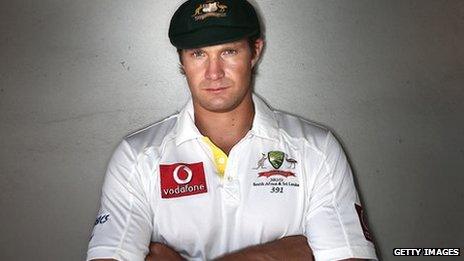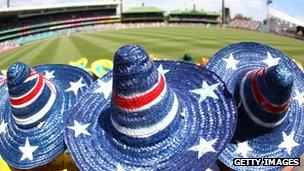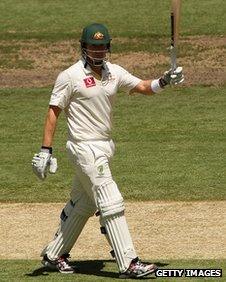Australia cricket: 'Homework failure' sparks debate
- Published

Watson was dropped from the team to face India in the third Test
Were one to build a prototype of an Australian international cricketer, it would surely resemble Shane Watson. Australia's vice-captain is blonde, broad-shouldered, lantern-jawed and often gelled.
It is easy to imagine him performing surf-life saving duties at Bondi, or in younger years, playing the high school heartthrob on an afternoon soap.
When he strides to the crease at the start of his innings, it looks not only as if he has emerged from the pavilion but also stepped straight out of central casting.
In the space of a dramatic few days however a talented, if injury-prone, all-rounder who should truly be the poster boy of Australian cricket has become persona non grata in the national set-up.
After Australia's humiliating defeat to India in the second test at Hyderabad - where they became the first side in test history to declare in the first innings but then lose by an innings - players were asked to identify three areas of possible improvement.
Watson's failure to hand in his homework, along with the bowlers Mitchell Johnson, James Pattinson and batsman Usman Khawaja, was met by a fourth-form style punishment: suspension from the test team to face India in the third test match.
'Extremely harsh'
To some it was a ridiculous over-reaction and a case of sporting micro-managerialism gone mad.
To others, it was just punishment for failing to perform a routine task over a couple of rest days when there were few other demands on the highly remunerated players' time.

Some say Australian cricket is in crisis, with the team missing former captain Ricky Ponting
To those who observe player politics closely, it was also another indication of a divided dressing room.
Watson delivered his own verdict by leaving the team hotel and catching a plane home. Not for him the five-star naughty corner. Besides, his wife Lee is heavily pregnant, and understandably he wants to attend the birth of their first child.
Returning home to Sydney, he called his suspension "extremely harsh".
He also aimed some stout words at Cricket Australia's high-performance manager, Pat Howard, a former international rugby player, who told reporters that Watson was only "sometimes" a team player.
"He has come from a rugby background," Watson told the press pack, which awaited him in the arrivals hall, "and he hasn't been in and around cricket very long."
'Embarrassment'
The team management however has no regrets. Michael Clarke said that players had to "uphere" to certain standards (with a 100-plus batting average over the past 12 months, fans will surely forgive him the invention of the word "uphere").
His coach, the South African Mickey Arthur, has called this a "line in the sand", and likened it to the England coach Andy Flower standing up to the former captain Kevin Pietersen.
Doubtless there is alliterative allure in the headline, Cricket in Crisis, but it also offers a neat summation of the travails on the India tour, where Australia has already lost the first two tests of a four match series.
With only 12 players from which to choose, it will struggle to field a balanced and match-winning side.
"The cricket world is laughing at Australia's embarrassment," writes the veteran ABC commentator, Jim Maxwell, the voice of the southern summer.
Former senior players, many of whom believe that the role of a team coach is solely for transportation, have been critical of what they see as the management's heavy-handedness. Witheringly so.
"I've never heard anything so stupid in all my life," protested the former batsman, Mark Waugh. "It's not under 6s - this is Test cricket."
Darren Lehmann, the former all-rounder who now coaches Queensland, was also damning. "Adults we are," he tweeted, "not schoolboys."
'Play better'
Nor have former England stars missed the opportunity for a good sledge.

A number of sportsmen have come to Watson's defence
"Bowl better, bat better, catch better, communicate better… just bloody play better," was the former England captain Michael Vaughan's mocking appraisal. "Didn't realise you had to do an essay to get a selection these days?"
Others however have backed Cricket Australia's tough line. Daniel Zammit, who has acted as Usman Khawaja's agent, believes the players only have themselves to blame.
"Cricketers are not special," he said, and should abide by standards that have long been the norm in rugby league, rugby union and other professional codes.
"On Monday in India, Mickey Arthur treated his players no different to other team sports players," he said.
"For this we should be thankful that our national head coach has the 'stones' to stand up and be a leader with big decisions meant to fix a team attitude problem."
Certainly, the managerial culture of Australian cricket is nothing new.
John Buchanan, who coached the national side during its period of dominance in the Naughties, was famed for his Power Point team briefings and for pushing books under the hotel doors of his players that he thought would improve them as men and players.
In preparation for the 2006 Ashes, he even took the team on a boot camp in outback Queensland - much to the displeasure of Shane Warne.
The main difference between then and now is the quality of the cricketing personnel. Buchanan had charge of a team of legends - Warne, Glenn McGrath, Adam Gilchrist, Ricky Ponting, Matthew Hayden,
The present outfit is short on talent, experience and arguably aptitude.
Team spirit also seems to be a problem. There is a backstory to the present dispute, which involves a disagreement from the night that the retiring test great Mike Hussey played his final match in Sydney.
In celebration, he wanted to kick back with a few cold beers in the dressing room and at the team hotel. Clarke insisted that the team go on a cruise of Sydney harbour onboard the billionaire businessman James Packer's boat. On that disputed night, Watson stayed onshore with Hussey.
With an Ashes tour only a few months away, all is not well within the Australian camp, where team morale has suffered too from the absence of the influential former captain Ricky Ponting.
Only six years ago, cricket was a unipolar world in which Australia was the sole superpower. Understandably, the Baggy Greens have not yet recovered from the loss of its generation of greats.
They played for an Ashes and World Cup-winning team, for which the post-match rituals mainly involved beer rather than bullet points.